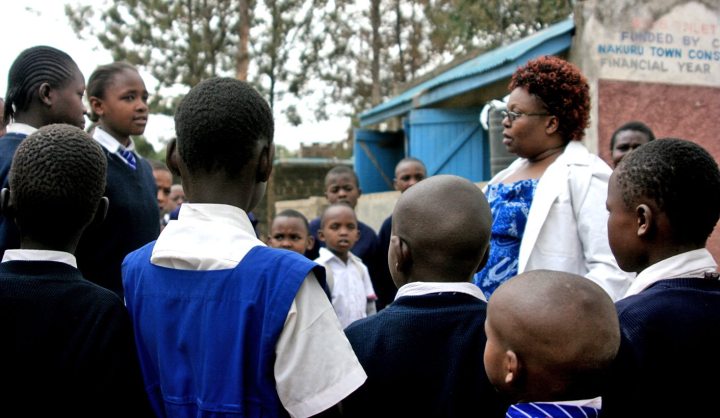Africa
One woman’s crusade to end cholera in Kenya

With Kenya in the grip of another deadly cholera outbreak, Lillian King is doing something to make a difference. By NJERI KIMANI.
It started in 2013, when Lillian King went to answer a call of nature at a local primary school where she was waiting to cast her vote in national elections.
On reaching the toilets, she was shocked by their sorry state: the doors were broken, the toilets themselves falling over, and there were sanitary pads all over the floor. It smelled terrible.
However, her real torment came when she entered one of the toilets. She was in the middle of her business when she felt something crawling on her legs.
“On checking I saw maggots making their way up to my knee. I just ran out screaming. I even finished dressing from outside,” said King.
Back in the queue, she made a solemn vow to do something about the toilets. She knew that dirty toilets led to cholera, and she knew that cholera was a killer, having already lost a daughter to the disease. She swore that no other woman would shed tears due to a disease which could – and should – be prevented.
“I knew that this was the greatest breeding ground for cholera, and that it could cost someone a child like it had cost me. Having been met by faeces all over, I wondered how kindergarten and lower primary pupils were able to use it without coming into contact with their murk,” she added.
King started doing a survey in the schools in the county, where she found that most toilets were neglected by school management. This was mainly due to lack of water – water is expensive, and many schools had been cut off after failing to pay the hefty bills.
“I went to visit Menengai primary school [in Nakuru] for the visually impaired and saw a blind child trying to look for where to hold on the toilet. She however slipped and fell on the waste, and struggled to get up. She started wiping her eyes with her hands and by the time she got out of there, she was a horrible mess,” said King.
To fix the problem, King started the Adopt a Loo initiative. She called her friends to each choose a toilet, which they would then sponsor by donating tissues, water and soap.
She started with a pilot project at Crater Primary School in Nakuru.
“I took some women from a women’s group and talked to them about the idea of cleaning toilets. We were constrained financially but I knew how to make homemade soap. I ferried water from my place and bought some brooms. When we arrived there we first held talks with the children where I explained to them about proper sanitation. After that I went directly to the toilets and went through the cleaning process with the teachers,” she said.
King did this every day. Eventually, she hired someone to sit next to the toilets and offer toilet paper to the children before they used the toilet.
Slowly, she was able to change the image of the toilets.
“We tried fixing the ones we could, but we focused on general cleaning to ensure that the toilets were comfortable enough for the child. The change has been magnificent. Pupil’s attendance has shot up magnificently. In the course we discovered that some children even failed to come to school as they feared going to the toilets. In some cases, girls who were on their menstrual period would fail to come, citing that the poor toilets were not places they could change from,” she said.
With Kenya in the grip of yet another cholera outbreak – 12 counties currently have cholera cases, while six people died recently in Tana River County – King wants to take this initiative countrywide, saying it will reduce the risk of cholera contraction by at least 90%.
“Cholera can be controlled by good sanitation. We have embarked on making the kids enjoy the process. In fact, we call them ‘Clean Toilets Ambassadors’. And they have also been instrumental in going to their parents and teaching them on basic sanitation including the hand washing process after the toilets.” DM
Photo: Lillian King at a primary school in Nakuru (Credit: Njeri Kimani)



















 Become an Insider
Become an Insider